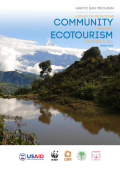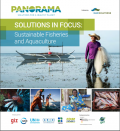In the Republic of the Maldives, coral reefs and associated habitats provide valuable ecosystem services such as fish and other food, natural hazard protection, climate regulation, and the beaches, clear blue waters, and seascapes that are the basis for the thriving tourism industry. The key habitats that contribute to the delivery of valuable ecosystem services in the Maldives include coral reefs, tidal flats, seagrass beds, beaches, mangroves, and offshore pelagic areas and seamounts.
This report lays the groundwork for a description of the factors affecting ecosystem services delivery in the Maldives—both favourably, in the sense of management to restore or enhance ecosystem services delivery, and negatively, in the sense of summarising human pressures and natural factors that contribute to a decline in ecosystem health or a decrease in ecosystem services delivery.
The analysis presented in this report clearly shows that investing in coral reef management would be beneficial to the economy of North Ari Atoll. If coral reefs of North Ari Atoll were allowed to degrade and were not managed properly, this could impact both revenue from tourism and productivity from fisheries, leading to estimated losses of USD 148.54 million to USD 288.54 million (in NPV compared to the BAU estimates), depending upon the discount rates used, over a 30-year time horizon. However, investing in improved coral reef management would provide returns of between USD 15.78 million and USD 48.67 million over a 30-year time-period with the lower investment scenario, and between USD 24.01 million and USD 75.69 with the higher investment scenario.



